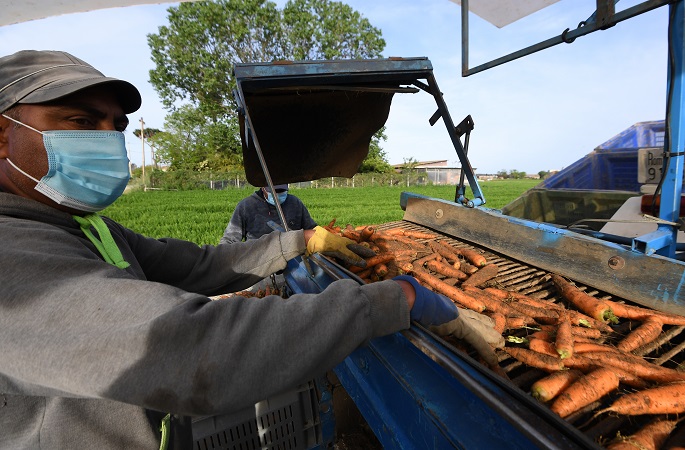Italy's adoption of changes on foreign workers a "first" in Europe
Published : 16 May 2020, 18:22
Updated : 17 May 2020, 01:19
Italy this week became the first European Union (EU) member state to approve a plan to temporarily allow undocumented workers from outside the bloc to work legally in the agricultural sector or as domestic helpers, a move analysts said would help Italian farmers save foreign workers from labor abuses while also widening the country's tax base.
The initiative, which aims to temporarily regularize undocumented workers to fill key jobs needed in the country in the midst of the COVID-19 pandemic, has long been championed by Minister of Agriculture Teresa Bellanova, who became so emotional upon signing the measure into law that she broke down into tears.
"I cried because I worked hard," the minister said Thursday, the day after the measure was finalized. "I fought for something I believed in and in the end I wept. I fought a battle for something I have believed in for a long time."
Analysts said the measure puts Italy on the front lines of an often controversial issue in Europe.
"This was an extraordinary measure that will have many impacts," Jean-Rene Bilongo, national secretary of the CGIL-Federation of Agro-Industry Workers, a leading trade union, told Xinhua. "Italians don't realize how much they depend on people who are left on the margins of society. This is an important step toward changing that."
Bilongo said Italy is the first European country to take such a step on such a wide scale.
The plan, which was opposed by the main opposition political party, the right-wing anti-migrant League, could have a long-term impact on as many as 600,000 undocumented foreign workers. An estimate released Friday by the office of Minister of the Interior Luciana Lamorgese indicated that around 200,000 workers in the agricultural sector, as well as domestic employees, would be immediately eligible for the permits.
For those who are eligible, the measure will result in temporary residence permits -- for up to six months at a time -- giving them proof of employment that would allow them to open bank accounts, rent apartments, and apply for credit. It also means the workers would appear on tax rolls and if they put in enough years of service, they could qualify for pensions.
Bellanova has championed this kind of reform for years, arguing that many undocumented workers were often underpaid and forced to work and live under harsh conditions. But it was the global coronavirus outbreak that helped make the idea more mainstream.
Coldiretti, Italy's main agricultural union, said in recent weeks that coronavirus lockdown restrictions mean that many agricultural products risked not being picked, processed, or sent to markets because there were not enough workers available to do the work involved.
Rocchina Staiano, a professor of social security law at the University of Teramo, applauded the reform but said it was too early to know how effective it will be.
"A measure that takes workers out of the black market and brings them into the economy is positive," Staiano said in an interview. "But this is a complicated area, and we don't know how things will play out. I think we will know a lot more by July."
Emiliano Reyneri, a professor emeritus at the University of Milano-Bicocca specializing in labor sociology, also saw the reform as a positive step, but he said it should have covered more foreign workers, especially considering the country is in the midst of a health crisis tied to the coronavirus.
"They could have also included non-European healthcare workers," Reyneri told Xinhua. "There are many fields where undocumented foreign workers are employed and I understand not all of them can be addressed. But we're in a health emergency and including health care workers would have had merit."


